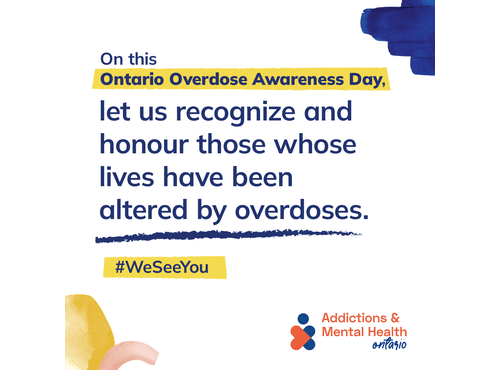Since 2001, communities worldwide have been observing International Overdose Awareness Day on August 31. The aim of the day is to raise awareness about drug poisoning, provide learning opportunities about overdose prevention, and to publicly mourn those we have lost to overdose. Today is also a time to emphasize the importance of evidence-based policy and practice, and to make substance use services a priority for public funding. Finally, Overdose Awareness Day seeks to send a loud, public message to people who use drugs that their lives are valued.
Chances are high that you know and love someone who uses drugs. You may have even lost someone to overdose yourself. It’s impossible to deny that people who use drugs are important and vital parts of our lives and communities. Too often, due to a toxic drug supply, limited access to harm reduction supplies, or a lack of awareness of safe use strategies, people who use drugs encounter risks that could be easily avoided if they were able to access support. Since 2016, Canada has seen a total of 36,422 apparent opioid toxicity deaths, averaging of 20 deaths per day in 2022. These numbers reflect a profound failure to center and prioritize the needs and lives of people who use drugs. With the right care and support, drug poisoning deaths are avoidable. We reflect on the reality that these deaths were caused by the stigma and criminalization that people who use drugs experience, failed drug policies, political heel dragging, and inaction.
Common narratives about substance use fail to do justice to the complex reality that surrounds it. Although substance use is a common part of our lives, some substances are highly stigmatized. This creates a taboo around talking about things such as safe use strategies, or overdose prevention. It also leads to a lack of resources and funding allocated to supporting people who use drugs. Most importantly, the stigmatization of substance use pushes the lives of people who use drugs to the sidelines. Our society has failed to extend basic and necessary care and compassion to those who use drugs.
The good news – overdoses are both preventable and reversible. We know that every overdose death we’ve seen in the past few years could have been avoided. With education, a safe supply, harm reduction resources, decriminalization, and access to personal support, people can avoid many of the harms associated with drug use, including overdose. This begins with having open conversations about safe use.
This year’s theme for International Overdose Awareness Day is “Recognizing those people who go unseen.” Today we honor the people whose lives have been altered by overdose. They are the family and friends grieving the loss of a loved one; workers in healthcare and support services extending strength and compassion; or spontaneous first responders who selflessly assume the role of lifesaver.
We would like to say to these people: #weseeyou. Theirs are the voices we should amplify, and their strength and experience should be held up as examples to us all. Too often, however, they are left to bear the burden of this crisis alone and in silence.
This year on August 31, let’s acknowledge and support the people in our communities who go unrecognized by raising awareness of the hidden impacts of overdose, promoting education of overdose response, and reaching out to politicians to make lasting, lifesaving policy changes.
